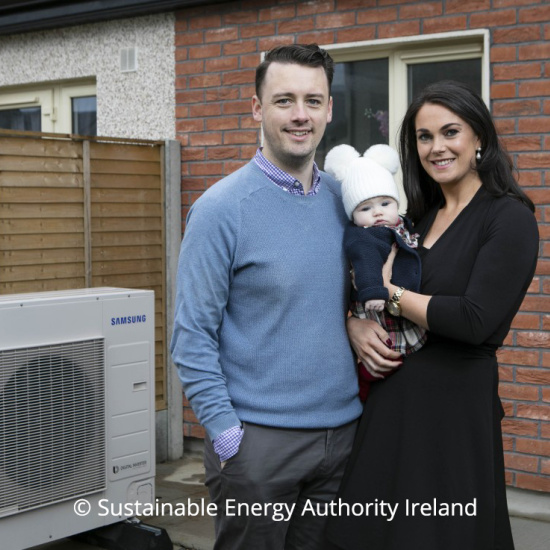Heat Pump opportunities for Irish homes
Battle of the Brands
In 2018, SEAI launched a programme of supports for heat pumps which has received 550 applications to date. Following a recent talk I gave at the SEAI Energy Show, I want to summarise some key information. This may be of interest to people working in the sector.
The most popular types of heat pumps being retrofitted in Ireland are air-to-water (95%). These are ideal for Ireland's moderate, moist climate. Overall, three main brands are vying for top position in this sector: Mitsubishi, Daikin and Panasonic.
Age and size of property and costs of works
The early adopters are people with large homes. The average grant recipient lives in a 195m2-home and the average home was built in the 1970s. Fifty percent of the homeowners completed insulation works at the same time. The other fifty percent being "heat pump-ready". This means the homes had a low heat loss and did not require any further insulation or window upgrades.
The average cost of works was about €11,000, for which there was a grant of €3,500. The cost of works varied from €4,000 to €27,000. 75% of homes were detached. A small number of geothermal heat pumps were installed and cost between €7,000 and €32,000.
Number of heat pump-ready homes in your county
After mining the BER database, we now know how many homes in each county are heat pump-ready. We also know how many of these homes are currently using an oil boiler or solid fuel system. There are a particularly high number of heat pump-ready homes in Dublin, Cork, Limerick, Galway and Kerry. However, all counties have significant numbers. The Government is particularly keen to ensure that homes on oil and solid fuel make the transition to heat pumps.
Heat pump-ready homes are defined as homes with a Heat Loss Indicator of 2.0 Watts/Kelvin/m2, or 2.3 with some caveats. The Heat Loss Indicator brings all U-values and ventilation values together in one figure. Over 350,000 homes have a heat loss indicator of 2.3 or less and 196,000 have a HLI of 2.0 or less.
| Homes in Ireland | 2,003,645 |
|---|---|
| Homes in BER Database | 860,000 |
| Homes with HLI <2 to 2010 | 196,244 |
| Homes with HLI <2.3 to 2010 | 351,295 |
Challenges
The biggest challenge for SEAI is changing the mindset of installers from simply installing a heat pump. They need to move to designing and installing the heat pump system from A to Z. This means calculating the heat loss on a room-by-room basis and sizing of radiators, unless underfloor heating is present.
Some manufacturers are offering excellent supports to installers in calculating the heating requirements. This element is critical as it impacts on energy and carbon savings. Alternatively, contractors/installers can outsource this work to a Technical Advisor. It is important to underline the fact that contractors/installers remain responsible for the installation.
Another challenge is growing the knowledge and skills-base required to install heat pump systems at scale. There are 5,000 plumbers active in Ireland, yet only 140 meet the SEAI criteria to install heat pumps. With sufficient upskilling and the necessary training supports from manufacturers, our transition to heat pumps could happen faster. If Ireland is to meet its targets, more plumbers will have to engage in training for heat pump installation. In addition, Solas will need to ensure that newly qualified plumbers can meet the demand.
One year on and SEAI has established a pathway to make heat pumps a sound alternative to fossil fuels. This is in line with the government strategy for the decarbonisation of heat. Success depends on growing the skills of installers, sound technical advice from Technical Advisors and support from manufacturers.
Notes: All homes must have a Heat Loss Indicator (HLI) of 2 Watts/Kelvin/m2 or 2.3 Watts/Kelvin/m2 with some caveats. Applicants must obtain a Technical Assessment from a registered Technical Advisor and use a registered installer from the SEAI website. Installers have signed up the SEAI Domestic Technical Specifications and Code of Practice.
Download the heat pump presentation Download the homeowner guide to heat pumps



